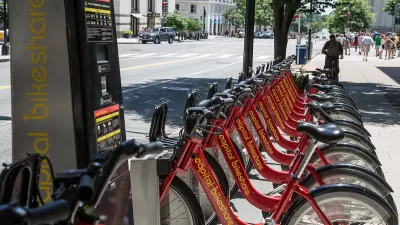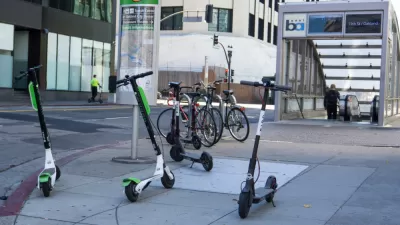The wildly popular system ‘frays at its geographic edges,’ making its use less effective outside the central District.

The Washington, D.C.-area Capital Bikeshare (CaBi) system is seeing record-breaking ridership, with the number of rides jumping almost 50 percent between October 2023 and October 2024.
According to a piece in Greater Greater Washington by David Meyer, “The growth is driven in part by local governments’ investment in new e-bikes, which began to make up a majority of CaBi rides in August. Members, who are more likely to be local, account for 66.6% of all rides—a sign of the system’s utility as a go-to commuting and transportation source for locals, not tourists.”
However, Meyer points out that the system still has some “regional deficiencies,” making some parts of the network more aesthetic than useful. “In DC, Mayor Muriel Bowser has pledged to put a bikeshare station within a quarter-mile of every resident’s home, a promise not matched by local lawmakers in many other parts of the region. As a result, walkable communities outside the District often lack the requisite CaBi station density required to make bikeshare a viable transportation option.”
Meyer suggests that CaBi should take a hard look at its governance model and perhaps take a more regional approach to strengthening the entire system and ensuring there are enough stations and bikes to serve outlying areas. Bringing CaBi under the umbrella of the regional transit agency could have advantages: “Treating CaBi as public transit could transform it from an amenity to a necessity in parts of the region where bikeshare doesn’t perform well at the moment.” However, it could also make the system more vulnerable to transit funding cuts.
FULL STORY: CaBi is a huge success. Will the program structure allow it to keep growing regionally?

Maui's Vacation Rental Debate Turns Ugly
Verbal attacks, misinformation campaigns and fistfights plague a high-stakes debate to convert thousands of vacation rentals into long-term housing.

Planetizen Federal Action Tracker
A weekly monitor of how Trump’s orders and actions are impacting planners and planning in America.

In Urban Planning, AI Prompting Could be the New Design Thinking
Creativity has long been key to great urban design. What if we see AI as our new creative partner?

Pedestrian Deaths Drop, Remain Twice as High as in 2009
Fatalities declined by 4 percent in 2024, but the U.S. is still nowhere close to ‘Vision Zero.’

King County Supportive Housing Program Offers Hope for Unhoused Residents
The county is taking a ‘Housing First’ approach that prioritizes getting people into housing, then offering wraparound supportive services.

Researchers Use AI to Get Clearer Picture of US Housing
Analysts are using artificial intelligence to supercharge their research by allowing them to comb through data faster. Though these AI tools can be error prone, they save time and housing researchers are optimistic about the future.
Urban Design for Planners 1: Software Tools
This six-course series explores essential urban design concepts using open source software and equips planners with the tools they need to participate fully in the urban design process.
Planning for Universal Design
Learn the tools for implementing Universal Design in planning regulations.
planning NEXT
Appalachian Highlands Housing Partners
Mpact (founded as Rail~Volution)
City of Camden Redevelopment Agency
City of Astoria
City of Portland
City of Laramie





























